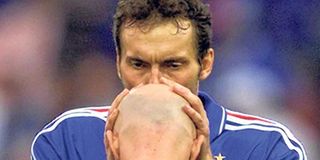How psychology rules football world

Enroute to France’s 1998 Fifa World Cup triumph, skipper Blanc kissed the forehead of custodian Barthez before every game to boost his confidence. AGENCIES PHOTO
On the eve of last season’s Champions League final, rumors surfaced linking Juventus midfield general Paul Pogba to a Barcelona move.
The player himself said it was his dream to play alongside Blagruana maestro Lionel Messi. Why wasn’t I surprised? Because unsettling star players of a rival team ahead of crucial encounters is one of the oldest tricks in the football psychology book.
The Nou Camp hierarchy may yet in future bid for the talented Frenchman. However, on that night in June the rumours were meant to distract the 22-year-old. I wasn’t surprised Pogba wasn’t at his mercurial best in the final.
It is a trick Paris St Germain had deployed on Chelsea in the round of 16, spreading news that they were interested in the Londoners’ talismanic Belgian Eden Hazard.
Once again, the English Premier League (EPL) Footballer of the Year was pedestrian as PSG knocked Jose Mourinho’s side out of the Champions League.
Even during the regular season, club managers routinely show interest or bandy around complimentary comments about rival players ahead of facing them. Ahead of a clash with Barcelona, a manager like Arsene Wenger can for example say, ‘I almost signed Lionel Messi when he was 13, except that he had to move with his family.’ Or ahead of a clash with Chelsea, he could say, “Didier Drogba almost joined Arsenal from Guigamp when he was 19 but I passed up the option.” The strategy doesn’t always work but the aim is clear - to create a soft spot in an otherwise dangerous opponent. It could even boomerang as a targeted player aims to emphasise his loyalty to current employers.
Penalty saves and spaghetti legs
Penalty-saving goalies tend to be exceptionally good psychologists. Their most common trick is to eyeball the penalty-taker and assure him of their confidence or kiss the football to create reasonable doubt. We all saw how Newcastle United’s Dutch international goalkeeper Tim Krul propelled his side to the World Cup semi-final using psyche.
He would pick up the ball, then assure the penalty takers that he knew the direction in which they were going to shoot.
Zimbabwean goal keeping legend Bruce Grobbelar was an original football psychologist. The former Liverpool shot stopper’s dancing legs, later christened spaghetti legs, helped the Kop win the 1984 European Cup against AS Roma.
Penalty takers were clearly distracted by his spider-like motions. You would have thought the trick was too old to surprise anyone.
Incredibly, another Liverpool keeper, Jerzy Dudek, used the same trick in the 2005 Champions League final as they beat AC Milan in a penalty shoot-out.
Haka dance and Barthez kiss
Good managers know that you have to instill fear in your opponents to soften them up for the kill.
Losing the fear factor causes as many complications for title chasing giants as injuries. Therefore, even when results are not going their way, managers must be adept at devising means of maintaining the pressure. During the run up to France’s1998 World Cup triumph, captain Laurent Blanc not only boosted his keeper Fabian Barthez’s confidence with a kiss to the head ahead of all games, he also sent shivers into opposition strikers by creating an impression the keeper was unbeatable.
It may be from a different sport, but there isn’t a better example of how to intimidate the opposition than New Zealand’s national rugby team’s Haka war dance. Even the most battle-hardened of rivals are in awe of the All Blacks when they break into their war song. Expectedly, the All Blacks are the world’s premier rugby playing nation despite having a population of just five million people.
Deflecting title pressure
Jose Mourinho’s emergence as a force to reckon with in the dug-out has its roots in his university degree in psychology. He uses psychology to excel as a man manager, manipulate the media and referees plus get under the skin of opponents.
The three EPL he has won have been premised on his ability to attract pressure to himself, allowing his Chelsea players to thrive under less media scrutiny.
It is an attribute former Newcastle United manager Kevin Keegan lacked as his Magpies let slip a four-point advantage with a game in hand to surrender the title to Sir Alex Ferguson’s Manchester United.
In an age in which players’ egos have sky-rocketed in direct proportion to their astronomical wages, a manager without formidable psychological skills is in the wrong business. You need a basketful of tricks up your sleeve to stay afloat.
[email protected]




